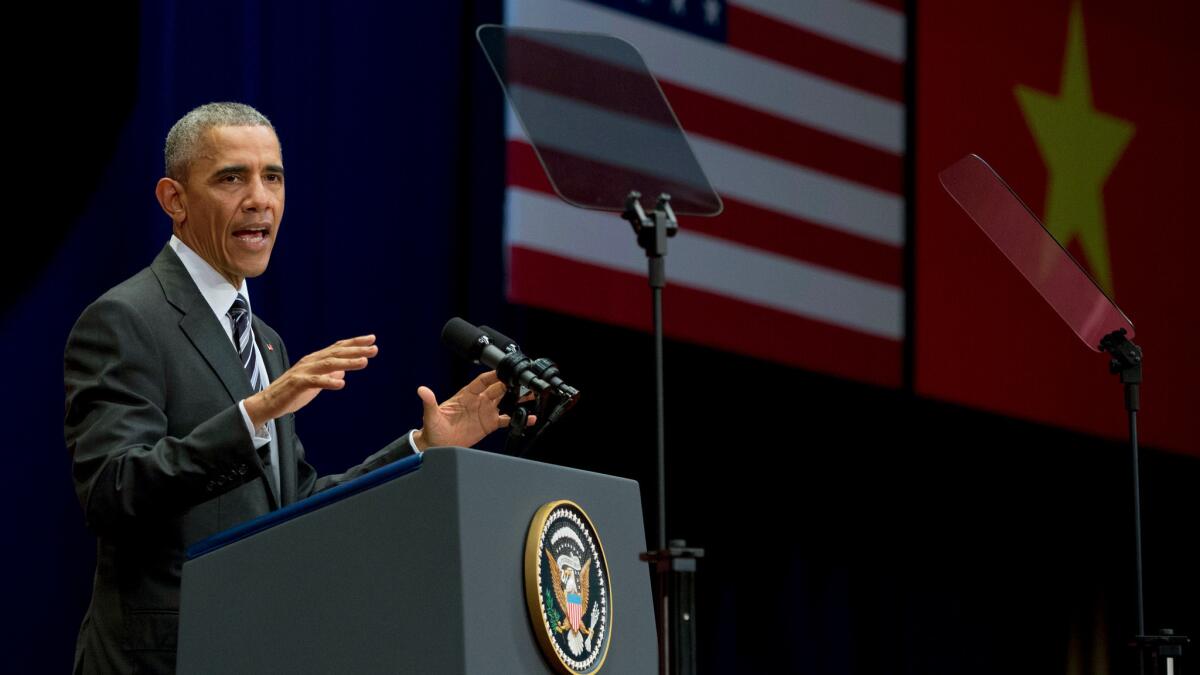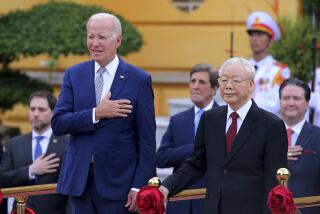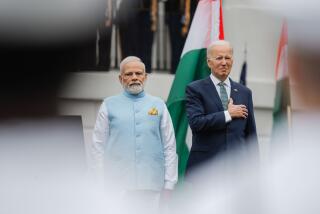Obama presses Vietnamese on human rights abuses as dissidents are barred from meeting him

- Share via
Reporting from Hanoi — While President Obama pressed his Vietnamese hosts Tuesday to ease their human rights abuses, as if to illustrate his point, some dissidents were barred from meeting with him in Hanoi.
Speaking to university students, Obama urged Vietnam’s government and people to insist on freedom of speech, assembly and religion, not least as a way to allow new ideas to gain hold and innovations to help the economy thrive.
“Upholding these rights is the fullest expression of the independence that so many cherish, including here, in a nation that proclaims itself to be of the people, by the people and for the people,” Obama said, citing a line from the Vietnamese constitution that echoes Abraham Lincoln’s Gettysburg Address.
But human rights advocates were outraged that three dissidents were barred or discouraged from meeting with Obama, pointing to their absence as a sign that Vietnam hasn’t earned the warming of relations and strengthened business relationships that Obama is in this country to promote.
“It’s like the government is putting on a demonstration for Obama of their repressive governance,” said John Sifton of the group Human Rights Watch.
Join the conversation on Facebook >>
The day provided a vivid illustration of the conflict at the heart of Obama’s mission to the U.S.’s former Cold War enemy this week, as well as to other authoritarian nations he sees as on the brink of possible reform.
Though nations including Vietnam, Myanmar and Laos are expanding their economies rapidly and presenting themselves as potential U.S. partners in trade and global security, Obama’s decision to engage with their governments links him with leaders at odds with dearly held American values like freedom of speech, religion and assembly.
On Tuesday, government agents reportedly pressured the three activists to keep them from sitting down with Obama, according to U.S. officials and Human Rights Watch.
Journalist Doan Tran was arrested on Monday, Sifton said. Nguyen Quang, an economist and candidate for National Assembly, was detained and prevented from leaving his house. And Ha Huy Son, a lawyer who has represented dissidents, was also prevented from traveling to meet Obama.
White House officials confirmed that the civil society leaders were stopped from attending the meeting but did not detail how.
Sifton said the episode was more evidence that Obama never should have taken the dramatic step Monday of dropping the Vietnam War-era arms embargo against the communist government without exacting concessions on human rights violations.
“The Vietnam regime has demonstrated today that it doesn’t deserve the closer ties the U.S. is offering,” he said. “Detaining or preventing civil society from meeting President Obama is not just an insult to the president, it’s also a human rights abuse in itself, a deprivation of the right to freedom of expression and freedom of movement.”
But Secretary of State John F. Kerry, a Vietnam War veteran traveling with Obama this week, said the incident showed exactly why U.S. engagement with the country was so critical. He said the meeting with dissidents, albeit without the full participation the U.S. had sought, “could not have been imagined 20 years ago,” when the U.S. first took steps to normalize relations with Vietnam. And it only could have happened because of Obama’s direct advocacy with his counterparts.
“That’s at the center of President Obama’s foreign policy,” Kerry told reporters, noting the approach here was also being applied to Cuba and Myanmar as well as Iraq and Afghanistan.
The kind of transformation Americans might expect will not take place overnight, he added. The Vietnamese have had to “be able to learn to manage and exercise certain rights and freedoms.”
“We have to recognize the road that they’re on is going to be a roller coaster ride to some degree,” he continued. “But as long as it’s moving in the same direction, that’s what is important, as long as the United States itself remains faithful to our values, and we’re always pushing in the right direction.”
It was significant, White House aides noted, that Obama himself publicly acknowledged the absence of some dissidents from the meeting. He said it showed that while there has been some “modest progress” on human rights, many still lack the full freedom to express dissent.
“It’s my hope that the government of Vietnam comes to recognize what we’ve recognized and what so many countries around the world have recognized, and that is that it’s very hard to prosper in this modern economy if you haven’t fully unleashed the potential of your people,” Obama said, adding that it was a message he brought directly to the four leaders he met with separately on Monday.
The deepening of ties seen on Obama’s visit, including his lifting of the ban on the sale of lethal weapons, was an important step, said Sen. Lindsey Graham (R-S.C.), even if he would have liked to see more done on human rights.
“Hopefully, this, over time, gives us more leverage to influence how Vietnam treats its people,” he said.
Obama must continue to press the Vietnamese on these issues, said Sen. John McCain (R-Ariz.), a former Vietnam prisoner of war who, along with Kerry, helped pave the way for normalization of relations.
“I was hoping that the president would insist before he went to meet with the dissidents of his choice. And he didn’t do that,” McCain said.
The Vietnamese government has not made enough progress on human rights, said McCain, who has repeatedly traveled to Vietnam and has regular contact with its leaders.
“Every time I meet with them, I mention that,” he said. “And strangely enough, they seem to acknowledge it.”
Staff writer Michael A. Memoli in Washington contributed to this report.
ALSO
Off the (failing) grid in North Korea, where solar energy is a hot commodity
Human rights groups say Saudi Arabia misused U.S.-made cluster bombs
North Korea is building something other than nukes: architecture with some zing
Follow @cparsons for news about the White House.
UPDATES:
1 p.m.: This story was updated with new details and comments from Obama and reaction from Sens. Lindsey Graham and John McCain.
This story was originally published at 12:05 a.m.
More to Read
Sign up for Essential California
The most important California stories and recommendations in your inbox every morning.
You may occasionally receive promotional content from the Los Angeles Times.











